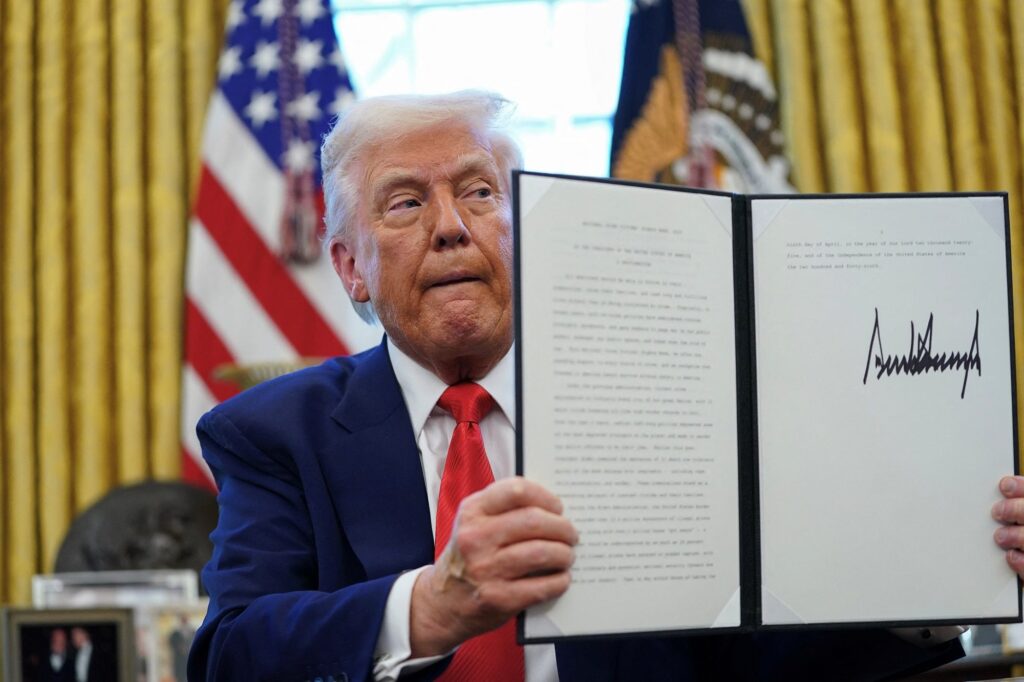It is often said that US trading partners have few good options when it comes to dealing with President Trump’s “liberation day” last week. Few good options, yes, but the members of the Gulf Cooperation Council at least have options.
Oil and gas are excluded from the new tariff regime – if one can call a bookie’s tote board a regime – but 10 percent on everything else does not feel like friendly behaviour.
Consider, for example, the commitments that GCC leaders offered at the time of the inauguration.
Item: last month, the UAE committed to invest $1.4 trillion over a decade in the US. There was more than a hint of political positioning about this but AI infrastructure, semiconductors, energy and manufacturing – all good, high-end, job-creating sectors – were mentioned.
Item: Trump has asked Saudi Arabia for $1 trillion worth of investment into the US over the next four years. The kingdom is “considering” the proposal. The president also wanted lower oil prices – he’s getting those – and normalisation of its relationship with Israel. A mere bagatelle.
Item: in January, UAE real estate mogul Hussain Sajwani said he would invest at least $20 billion, roughly the GDP of Lebanon, in data centres in the US.
Trade is less important in the US-GCC relationship than investment. US total goods trade with Saudi Arabia for example – presumably excluding weapons – was only $26 billion last year, split $13 billion each way.
Compare that to the holdings of Saudi Arabia’s Public Investment Fund. As my colleague Matt Smith has written, PIF has had a patchy time of it in the US thanks to an underperforming stake in electric vehicle maker Lucid. But holdings from Amazon to Microsoft to Salesforce to Marriott have been much more successful.
Nor there is doubting the commitment to the US economy – and to US jobs.
Then there is the debt market. As of January 2025 Saudi Arabia held $127 billion of US treasuries, the UAE $93 billion and Kuwait $49 billion.
Yet Matt has also written on suggestions by Stephen Miran, the head of the council of economic advisers, of withholding interest on debt to creditors who benefit from the US security umbrella. That would presumably include GCC states. This is not how debt contracts normally work – at least outside the bounds of the racetrack.
Trump is due in the region in the middle of next month. The trip to Saudi Arabia is to seal the supposed investment agreement, including purchases of military equipment. Qatar and the UAE are also in the frame.
Even if one assumes that the May visit will be an “I didn’t really mean it” affair, the behaviours of the new administration can only push the GCC states away from the US and into the arms of other partners.
Surely it was no accident that Hamdan bin Muhammed al Maktoum, Crown Prince of Dubai, headed a large delegation to India this week. India is not an easy place to do business but my colleague Sunil Singh has written that bilateral trade with the UAE has doubled since 2022.
India, by the way, was knobbled last week with a reciprocal 26 percent on exports to the US.
It is not just India. As our columnist Jonathan Fulton reported, in February a 140-strong delegation from Abu Dhabi visited Beijing, Shanghai, Shenzhen and Hong Kong over six days.
The nature of the Trump offer is becoming clearer: it is simply GCC cash for US security – or “protection” as it is otherwise known. But there are others who can offer at least part of the gear and more are becoming available all the time. Think Leopard tanks, think Meteor and Scalp missiles, the Homar-K and the Samp/T.
The GCC states may yet decide that they have other options available.
Register now: It’s easy and free
This content is available for registered members only. Register for your free account today for exclusive emails, special reports and event invitations.
Why sign up
Exclusive weekly email from our editor-in-chief
Personalised weekly emails for your preferred industry sectors
Read and download our insight packed white papers
Access to our mobile app
Prioritised access to live events
Already registered? Sign in



